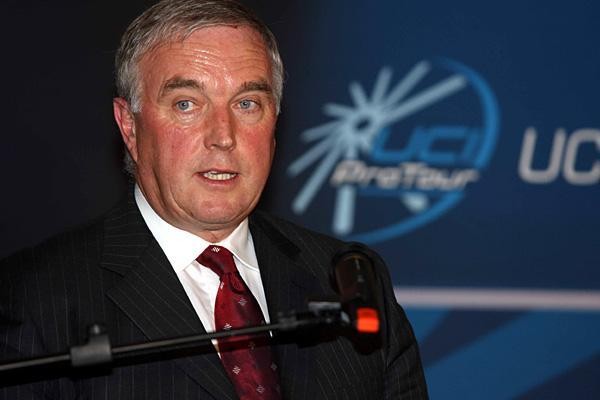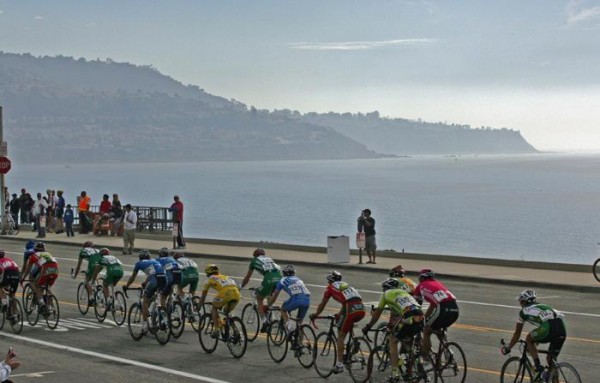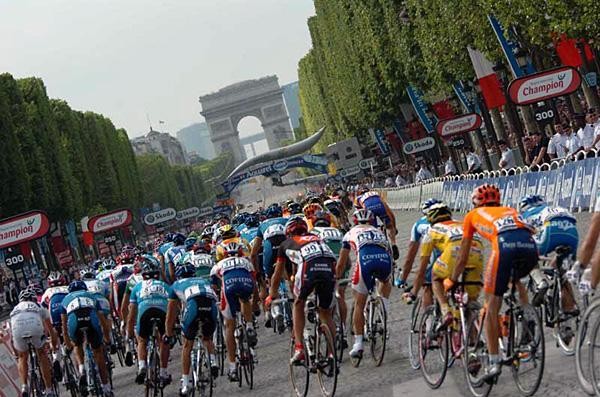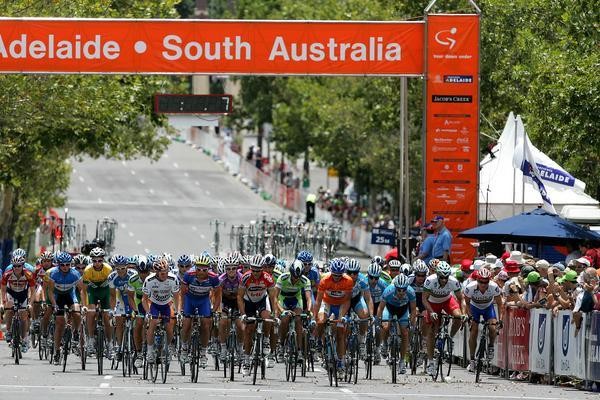UCI consider ProTour globalisation
Although each of the 27 events are currently based in Europe, the UCI's goal of furthering the...












News feature, December 23, 2006
Although each of the 27 events are currently based in Europe, the UCI's goal of furthering the global development of cycling means that the governing body is to consider the expansion of the ProTour series to other continents. Speaking to Cyclingnews this week, UCI president Pat McQuaid confirmed that the organisation would consider proposals from other countries to host such events, even if that necessitated an equivalent reduction in the European calendar.
"I wouldn't say it is a long way away," he stated. "The initial idea of the ProTour was to assist in the globalisation of the sport, to bring the sport at the highest level into as many markets as is possible. It was natural at the beginning that it could only be done at a European level, letting things develop there initially. Once that was done, we could then see what interest there is in bringing the ProTour to foreign shores."
On Monday USA Cycling flagged its intentions by issuing a press release stating that it was aiming to host a ProTour event within a short timeframe.
The communiqué underlined what it said was unprecedented growth, affirming that: "the future is so bright, USA Cycling has its sights set on and strongly believes the US will have a UCI ProTour race in the very near future.
"(UCI President) Pat McQuaid and the UCI have made clear their intention to truly globalise professional cycling and expand the highest level of the sport beyond its traditional Western European borders," said USA Cycling CEO Steve Johnson. "We are very supportive of the vision for the sport expressed by Mr McQuaid and believe that the US is perfectly positioned and prepared to be a player in the expansion of the ProTour outside of its present structure."
McQuaid acknowledged that the US is one contender to host an overseas ProTour event, but that there are others too. "There is interest there, and not just from America. I have also had a direct request from Mike Rann, who is the premier of South Australia, where the Tour Down Under takes place. He wants that to be a ProTour event.
The latest race content, interviews, features, reviews and expert buying guides, direct to your inbox!
"And then you have possibly got the Tour de Langkawi as well. If Langkawi can come back to what it was a couple of years ago, there is no reason why they couldn't consider applying for ProTour status. The fact that the Malaysian government have come in to assist, and to support the Tour de Langkawi shows that they are serious about developing the sport of cycling and also using the sport of cycling to promote the country and tourism.
"There is no reason why the ProTour cannot go outside Europe. The demand is growing and it is going to be more difficult to say no to them."
Standards increasing:
McQuaid says that the recent Asian Games have convinced him that the standard is fast rising in what is relatively new region for cycling. "They were excellent, excellent. The two road races were good, the time trials were good, but in particular the track made a strong impression. I only saw two days of those events but I was quite impressed by the level it was at. The gold, silver and bronze in the kilometre were all 1'04, which is a good standard.
"I was also in Moscow last Saturday and there were 41 nations taking part in the World Cup, which is a record. That shows that cycling is developing, it is growing worldwide and the standards are going up and up. As you saw, there was a world record broken in Moscow last weekend as well. There are lots of good signs for cycling, globally."
Within Europe the discord between the Grand Tour organisers and the UCI over the ProTour has been followed by the recent statement that six federations - France, Spain, Italy, Belgium, Austria and Luxembourg - have rejected the UCI's perception of what is the best way forward.
To some extent McQuaid sees this as a case of old world versus new world or, more specifically, part of the traditional power base of cycling resisting the UCI's chosen direction to grow the sport internationally.
USA Cycling's press release put the American federation firmly on the site of the UCI, with Johnson saying that the current path is the right one. "Pat McQuaid and the UCI have made clear their intention to truly globalise professional cycling and expand the highest level of the sport beyond its traditional Western European borders," he said. "This forward-looking vision and direction from the UCI is exactly what is required for professional cycling to reach new markets and grow in stature and popularity worldwide. We are very supportive of the vision for the sport expressed by Mr McQuaid and believe that the US is perfectly positioned and prepared to be a player in the expansion of the ProTour outside of its present structure."
Another endorsement came from British Cycling, who backed the ProTour and questioned the logic of the opposing federations. "I am very surprised and disappointed at the actions of a small number of other presidents of national federations in Europe," wrote British Cycling president Brian Cookson in a press release this week. "The group that have criticised President McQuaid and the UCI is a self-appointed one. They do not speak for the majority and have not even given us the courtesy of consulting us or discussing with us the issues they have raised.
"There are clear mechanisms and procedures for the European nations, through the European Cycling Union, and I urge all nations to abide by these methods in making their views known."
McQuaid welcomes this support at a time when there are clear tensions about the direction the UCI is taking. "Different members of the management committee of the UCI have expressed the fact that they are quite pleased to see federations come out publicly with their support" said McQuaid. "They are backing, firstly, the UCI vision and also saying that they feel the management committee is a democratic group and that any decisions the UCI has made have been made in a democratic way.
"However I think these four or five federations are actually acting in an undemocratic way. They don't seem to be prepared to accept democratic decisions, as such."
"The fact of the matter is that the UCI is a global organisation and must deal with the development of cycling globally. We cannot be pulled back to the 1960s when cycling was controlled by three or four federations. That is what is going on at the moment, that is what they are trying to do - bring the sport backwards."
As time passes it seems that the points of view of both camps are moving further and further apart. Both are equally convinced that theirs is the better way forward. McQuaid has stated before that cycling needs to take the ProTour direction and also to chase worldwide growth in order to compete with other big sports.
He strongly resists what he says is an attempt by these federations to limit growth and cling to the past. "I won't accept it, I never will, and I will fight it all the way, as much as I have to do in order to ensure that the UCI's vision of globalising the sport is continued," affirmed McQuaid. "That is why I was quite happy to see the press releases, particularly [the one] coming from the States, as it understands the need for globalisation in the sport.
"You only have to look at racing there and how things have progressed in the past couple of years since the reforms of cycling, as regards the way the American calendar has gone. In North America alone, in their UCI registered circuit of professional races, there is a very strong structure now of professional cycling there. That wasn't there two years ago, three years ago.
"When you look at what is going on there and see that Asia is following in the same lines, then it is clear that this is the way we have to go. And I will continue along this line, no matter what."
ProTour modifications - which races would be dropped?
Given that some feel the ProTour calendar is already choc-a-bloc with events, it is perhaps unsurprising that McQuaid feels that any introduction of new races outside Europe would necessitate the removal of others from the European program. While this may be met by some objections, the logic is understandable; teams would otherwise have to increase the number of their riders and staff and the scale of their budgets.
"I would see us having to make changes rather than increasing the number of events," he says. "The ProTour calendar as it stands is fairly full with 27 events. I don't think we can increase on that, and teams have told us that they cannot currently do any more. So if it is to happen and we were to take in races further afield, it would require cutting back slightly on races in Europe."
The big question is, of course, which races will drop down a level? The Grand Tour organisers have already said that they do not wish to be part of the ProTour, but the complication is that they run some of the most prestigious events in cycling. If historical races such as Tour de France, Giro d'Italia, Vuelta España, Paris-Roubaix or Milan San Remo are missing, the ProTour would clearly lose some of its lustre and relevance.
It takes a long time to become one of the monuments of the sport and so, while some of the newer ProTour events may be extremely well run and feature strong fields, victory there will not mean as much as a win in one of the traditional top races. Ironically, the races that would go without a fuss are the very ones that the ProTour needs to hold onto.
When asked if he sees the UCI dropping one or more of the races run by the Grand Tour organisers, McQuaid steers clear of expressing an opinion. "I wouldn't like to comment on what races might go or what races might stay. As far as we are concerned, all of the races on the ProTour calendar are of equal importance and all of the races get equal treatment.
"As a result, it would be a strategic decision as to what would come in and what would go out. In the case of that happening, I most certainly don't want to give the impression that any particular race is victimised. A strategic decision such as this will be done in a very, very open, transparent and, more importantly, a very democratic way."
But what of the Grand Tour organisers decision to change the selection criteria, a clear clash with the current rules of the ProTour?
"They can't just introduce something like this themselves," he answers. "They and everybody in the sport of cycling has to realise that it is a democracy and is run in a democratic way. People must accept that. We have to do things correctly - the UCI wouldn't exist for very long if individual organisers or individual federations can just do things their own way all around the world. We must have order."
"The rules and regulations of the UCI are not something that I have come up with, they are not something that my predecessor Hein Verbruggen have come up with. They are something that has been worked upon and agreed upon by many, many commissions and many, many federation personnel over many, many years. Those rules are there for everybody to follow. You can't have a situation where one or two small groups make their own rules. Everybody in cycling must follow the same rules.
"It is a democracy and that is the way we operate. You may not like it, but everybody must accept that it is a democracy. Nobody forces you to come into cycling, nobody forces you to organise events in the sport, but once you come into the family of cycling you accept the rules and regulations that are there. Otherwise, if you allow complete anarchy, that is what you will get - anarchy. And the sport of cycling will not develop if there is that going on."
McQuaid is aware that some within the sport will not agree with his take on things. Some will back the position of the Grand Tour organisers, while others such as the USA and British federations appear to be firmly onside, vis-à-vis the UCI vision. Many teams also agree. Those in the middle will simply regret that a resolution between the two sides still seems a long way away.
Time will tell how the planned globalisation of the ProTour plays out. Will Europe will remain the dominant epicentre of world cycling, or will races outside the continent assume an even greater important as the years go by? One thing is for sure; race fans in the US, Australia and Asia will welcome the possibility that someday, sooner or later, the world's top teams and riders could be competing in their backyard.